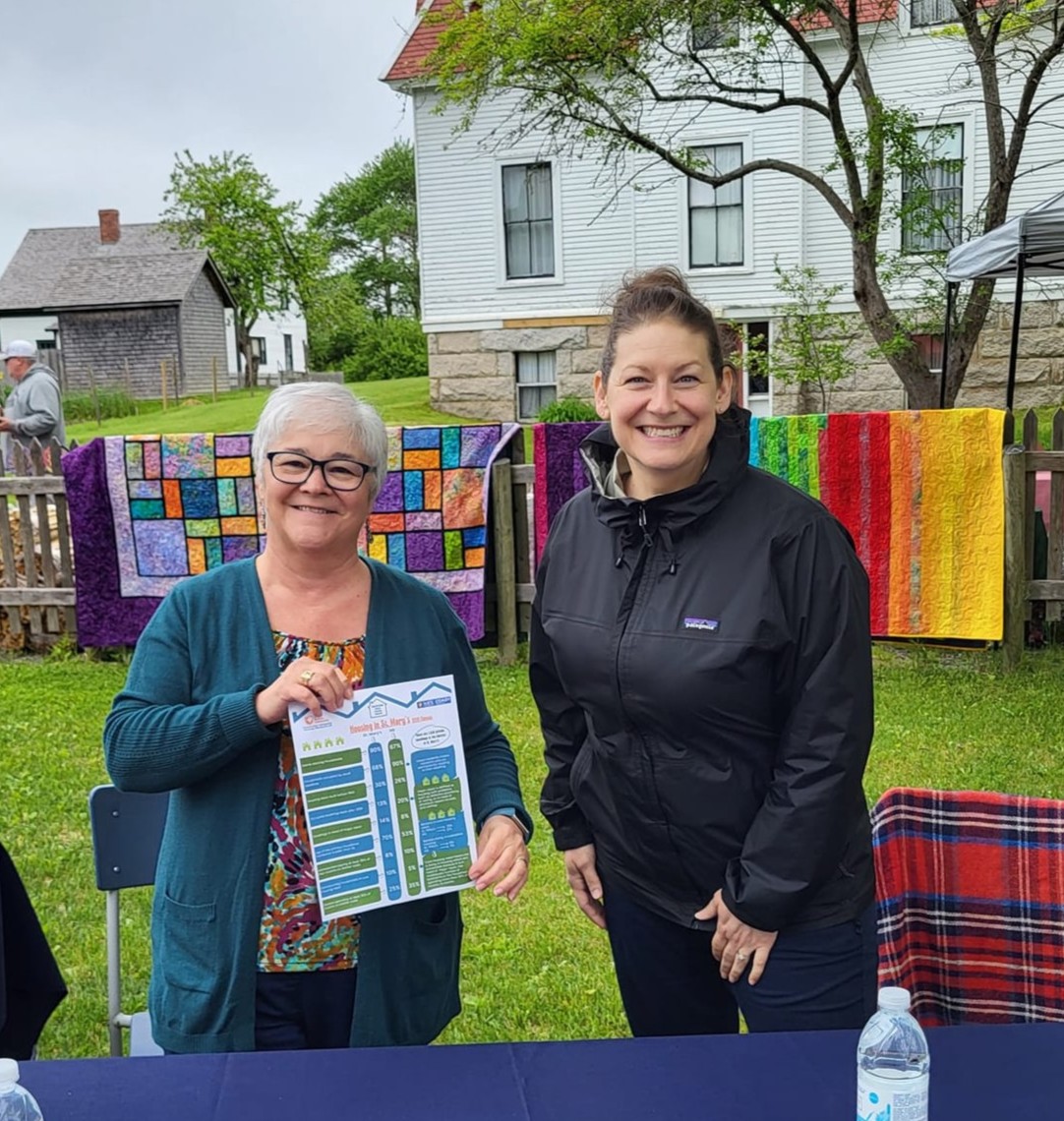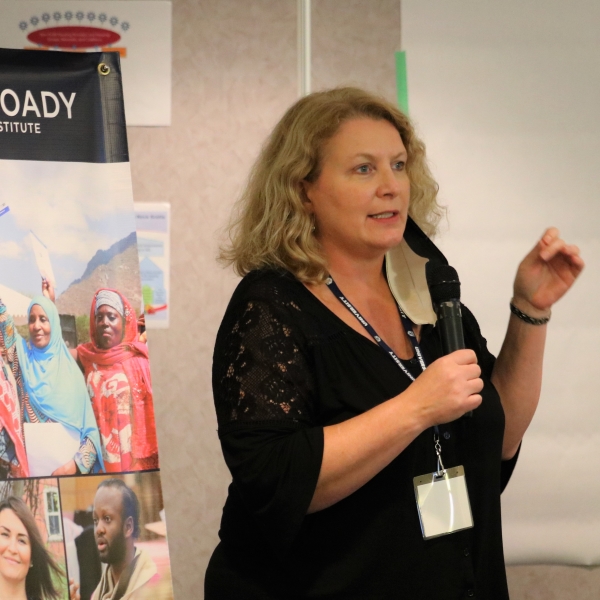November 22 is National Housing Day in Canada – a day that recognizes the importance of safe and affordable housing for all, and the need for collaborative solutions to housing insecurity.
Grassroots Origins
The Guysborough County Housing Network, formed in 2019, started informally as a group of service providers and individuals concerned about the shortage of housing in Guysborough County. The network focused on issues like affordable housing, poverty, food insecurity, and service coordination, recognizing these challenges as interconnected. They organized community meetings, collaborated with local groups, gathered data, and documented what they heard to better understand local housing needs.
“We created the network as a group of mostly service providers, or organizations, who were really seeing and feeling not just the impact of Covid, but the impact of a shortage of housing and what that was meaning in our communities,” Nancy O’Regan, a founding member of the network, says.
“We had people on the ground working with families who are experiencing poverty, intimate partner violence, and real reductions in income – all things that are impacted by and that impact housing.”
Andrea Donovan is a Health Promoter with Nova Scotia Health’s department of Mental Health and Addictions in the province’s eastern zone.
“Housing is obviously a huge need, not just for people who are experiencing mental health and addiction issues, but for people in general. When people aren’t housed, or when they’re precariously housed, we know that has a huge impact on their health, including their mental health,” Andrea says.
“That’s why I made [joining the housing network] a priority because I knew that it was going to have a major impact on people in the community, and the health status of the community.”
“When people aren’t housed, or when they’re not stably housed, or when they’re precariously housed, we know that has a huge impact on their health, including their mental health.”
The group gathered regularly to discuss the issues they, and their clients, were facing and to brainstorm ways they could help. They wrote letters to the editor to encourage people to support local organizations addressing interconnected issues such as food insecurity, affordability, and housing. With the support of Pauline MacIntosh (Coady Institute, StFX University) and Catherine Leviten-Reid (Cape Breton University), the group applied for a research grant that would support its desire to better understand community needs.
While Catherine conducted background research regarding housing supply, rental markets, and community demographics, Nancy and Pauline travelled across Guysborough County to conduct community engagement sessions.
“Pauline and I traveled the county, as we’re known to do, with a flip chart and some markers – very low tech. We visited six communities and talked to residents about what they were seeing in terms of housing, and the impact that a housing shortage was having on their community – that’s where we really heard the stories of how it’s impacting not just the communities today but looking to the future,” Nancy says.
The findings of this research highlighted three key priorities: developing affordable housing; collaborating to coordinate services for people in housing need; and creating employment-related housing (for example, housing for healthcare and/or seasonal workers).
To serve these priority areas, the group had to change. They started informally as a group of people with shared interests, but a legal structure would be required should the group become a housing service provider. So, in February 2024, a new organization was formed, Community First: Guysborough County Housing Association.

Nancy O’Regan and Denise Dunn set up at the Sherbrooke Market to talk to local community members.

Pauline MacIntish speaks at the founding meeting for the Nova Scotia Non-Profit Housing Association.
The Second Chapter
The new organization is composed of two parts – a community housing network of service providers and a Board of Directors which includes both individual and organizational members.
The Board is working on developing organizational policies and building its capacity in preparation of becoming a housing provider.
“We’re developing policies around how we will live out our value of being an anti-racist organization,” Nancy says.
“We’re going to be doing a lot of exchange around what microaggressions are and what’s happening with the local African Nova Scotian community. What’s happening with their land trust? What are they doing around emancipation activities? We’re building what our approach is going to be, but not just in how the organization is run, but also our selection of projects and/or selection of tenants.”
The organization is considering six new projects that would move it into a housing provider role.
“Some of them are acquisitions. Some of them are new builds. Some are looking at land. We are working closely with our two municipalities around that,” Nancy says.
“As we try to address affordable housing in an area as large as Guysborough County, we are engaging citizens, businesses, and municipal leaders to guide our work through advisory committees,” Nancy adds. “We will soon establish one in the District of St. Mary’s.”
Many of the organization’s members are taking part in trainings such as Cape Breton University’s affordable housing microcredit programs and CAHDCO (formerly, Centretown Affordable Housing Development Corporation) Toolbox sessions.
Meanwhile, the housing network is building relationships to help better coordinate services offered by various providers.
“We’ve been finding that there’s little coordination among service providers, not intentionally, but because there’s no mechanism to connect them,” Pauline says.
“So, part of the work that Andrea is leading is really about, how do we get all of those service providers working together so that those scarce resources have as much impact as possible?”
Learning through Partnership
Nancy and Pauline have worked together in various capacities over several decades, most recently through two related initiatives, Build Together and UN SDGs and Affordable Housing in Nova Scotia.
Build Together, a partnership between Coady Institute and the Community Housing Transformation Centre (The Centre), aimed to engage the community-housing sector in Nova Scotia in new ways of working together for greater collective impact. After numerous consultations with community housing services and providers across the province, a model for a provincial housing association was developed and the Nova Scotia Non-Profit Housing Association (NSNPHA) was formed.
The UN SDGs and Affordable Housing in Nova Scotia initiative aimed to understand the connection between the United Nations Sustainable Development Goals (UN SDGs) and housing, and how the SDGs can inform and inspire action in Nova Scotia communities.
Nancy says these experiences have helped build a foundation for her new role as Chair of the Board of Directors for Community First: Guysborough County Housing Association.
“I saw and heard from so many organizations about the issues they were facing in trying to get going. It added to my own knowledge and capacity building,” she says.
“Those two experiences really created a lot of the readiness that I needed to be able to guide this organization.”
Learn more about Coady’s Community Engagement work including its Community Housing Program:
